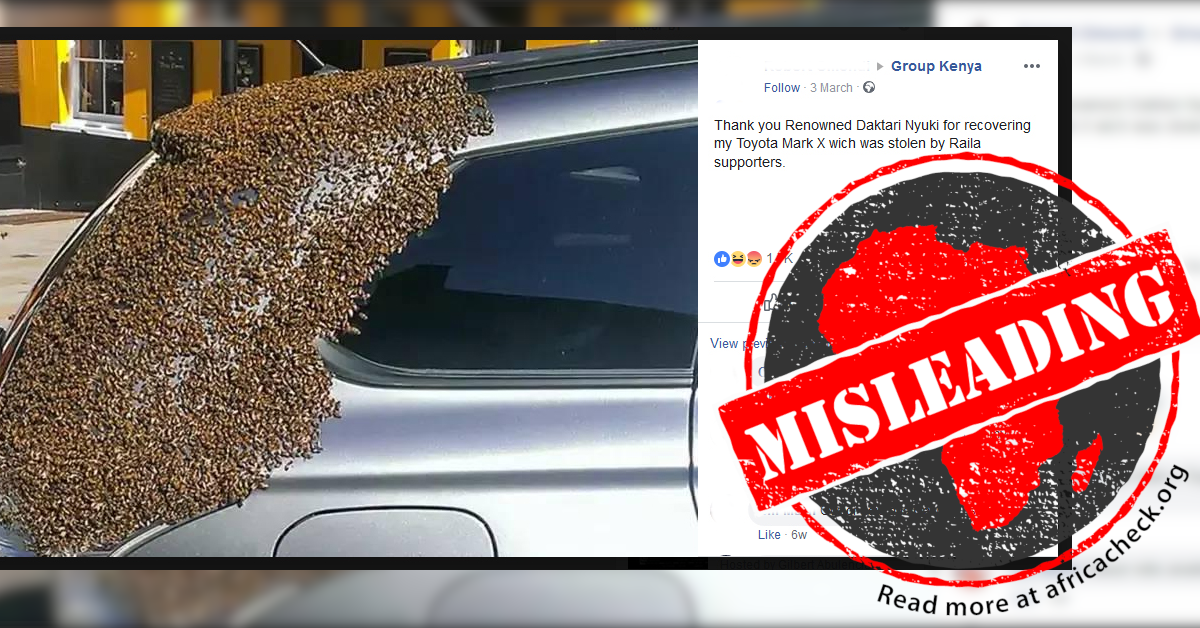Did a swarm of bees magically recover a stolen car in Kenya?
In March 2019 a Facebook user posted a photo showing a mass of bees clinging to the back of a car.
“Thank you renowned Daktari Nyuki for recovering my Toyota Mark X which was stolen by Raila supporters,” the user wrote on the Group Kenya page, which has almost 2 million members.
Raila Odinga is leader of the Orange Democratic Movement, the main opposition party in Kenya’s parliament. Daktari Nyuki is a traditional healer believed to be able to control bees.
The post attracted over 1,700 reactions and almost 800 comments. The screenshot of the post was later shared on another Facebook group with 840,000 members.

A few days after the first post, the photo was reused to point a finger at Kenya’s ruling Jubilee Party.
“Thank you renowned Daktari Nyuki for bringing back my Toyota Mark X which was stolen by Uhuru supporters,” reads the post on a group with over 484,000 members. Uhuru Kenyatta is the president of Kenya and head of the Jubilee Party.
The image was also used in phony story about the recovery of a vehicle in Nandi county.
But the photo of bees on the back of a car wasn’t taken in Kenya, and isn’t recent.
A reverse image search shows it’s been online since 2016.
An article in the UK’s Guardian newspaper, dated 24 May 2016 and headlined “Bee swarm clinging to car boot has Welsh town abuzz”, reveals the photo was taken in Wales.
The insects were thought to have swarmed onto the back of a silver Mitsubishi Outlander after their queen got stuck in its boot.
The photo was credited to Tom Moses, a ranger at the Pembrokeshire Coast National Park in Wales.
Africa Check contacted Moses to confirm it was his.
“I took this photo in Haverfordwest, Wales in 2016,” he said.
“A queen bee had got stuck in the gap between the door and car body, and the bee colony swarmed onto the car to be close to her. A beekeeper came and removed the colony.” – Dancan Bwire (23/04/19)
In March 2019 a Facebook user posted a photo showing a mass of bees clinging to the back of a car.
“Thank you renowned Daktari Nyuki for recovering my Toyota Mark X which was stolen by Raila supporters,” the user wrote on the Group Kenya page, which has almost 2 million members.
Raila Odinga is leader of the Orange Democratic Movement, the main opposition party in Kenya’s parliament. Daktari Nyuki is a traditional healer believed to be able to control bees.
The post attracted over 1,700 reactions and almost 800 comments. The screenshot of the post was later shared on another Facebook group with 840,000 members.

‘Stolen by Uhuru supporters’
A few days after the first post, the photo was reused to point a finger at Kenya’s ruling Jubilee Party.
“Thank you renowned Daktari Nyuki for bringing back my Toyota Mark X which was stolen by Uhuru supporters,” reads the post on a group with over 484,000 members. Uhuru Kenyatta is the president of Kenya and head of the Jubilee Party.
The image was also used in phony story about the recovery of a vehicle in Nandi county.
Queen bee stuck in boot of car – in Wales
But the photo of bees on the back of a car wasn’t taken in Kenya, and isn’t recent.
A reverse image search shows it’s been online since 2016.
An article in the UK’s Guardian newspaper, dated 24 May 2016 and headlined “Bee swarm clinging to car boot has Welsh town abuzz”, reveals the photo was taken in Wales.
The insects were thought to have swarmed onto the back of a silver Mitsubishi Outlander after their queen got stuck in its boot.
The photo was credited to Tom Moses, a ranger at the Pembrokeshire Coast National Park in Wales.
Africa Check contacted Moses to confirm it was his.
“I took this photo in Haverfordwest, Wales in 2016,” he said.
“A queen bee had got stuck in the gap between the door and car body, and the bee colony swarmed onto the car to be close to her. A beekeeper came and removed the colony.” – Dancan Bwire (23/04/19)
Republish our content for free
For publishers: what to do if your post is rated false
A fact-checker has rated your Facebook or Instagram post as “false”, “altered”, “partly false” or “missing context”. This could have serious consequences. What do you do?
Click on our guide for the steps you should follow.
Publishers guideAfrica Check teams up with Facebook
Africa Check is a partner in Meta's third-party fact-checking programme to help stop the spread of false information on social media.
The content we rate as “false” will be downgraded on Facebook and Instagram. This means fewer people will see it.
You can also help identify false information on Facebook. This guide explains how.


Add new comment